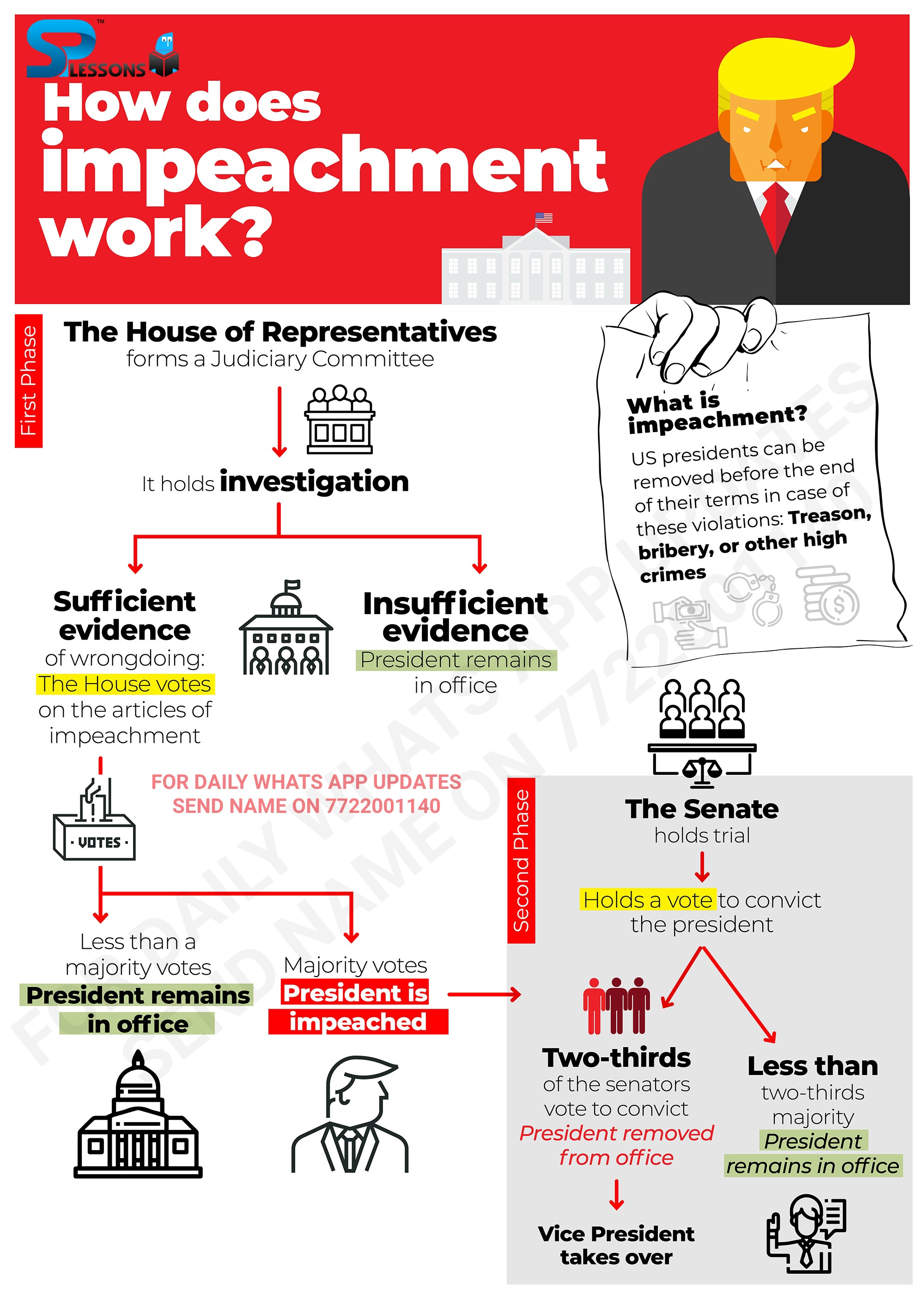 Introduction
Introduction
How can the US President be impeached?
The US founders established the presidency office and were afraid of its powers being misused. They, therefore, inserted a procedure in the Constitution to replace the President.
- They granted the House the main authority of impeachment; the Senate, the main authority to prosecute all impeachments; and the Supreme Court’s Chief Justice’s authority to exercise control over Senate impeachment proceedings.
- Members of the House serve as prosecutors, senators as jurors and the US Supreme Court’s Chief Justice administers.
- Impeachment commences in the House, the lower chamber, where a simple majority of 435 members of the House will discuss and end up voting on either to take legal actions against the President by accepting an impeachment resolution or articles of impeachment.
- If the House accepts articles of impeachment, then the Senate must hold a trial.
- A majority of 2/3 rd votes is necessary to prosecute and replace the President, in the 100 members Senate.
- The President may be impeached under the Constitution for sedition, corruption, or other serious crimes and offenses.
-
i. Richard Nixon resigned before his removal.
ii. The House impeached Andrew Johnson and Bill Clinton but the Senate did not prosecute them.
Did You Know?
US Supreme Court Chief Justice in 2019 – John Roberts
 Donald Trump
Donald Trump
What are the grounds for the impeachment of Mr. Trump?
The investigation against Donald Trump started as the US President Donald Trump and other top government officials compelled Ukraine and other countries to declare officially the investigations of the prior US Vice President and 2020 leading Democratic Presidential candidate Joe Biden and his son Hunter and publish evidence representing Ukraine’s fringe theory of evidence in the 2016 US elections.
- The investigation takes place around a phone call between Trump and the President of Ukraine, Volodymyr Zelensky, which indicates that the US military support for Ukraine had to be denied until Zelensky abides by the above requirement.
- Many witnesses, including Bill Taylor (the US top ambassador in Ukraine), Laura Cooper (the US top officer of the Pentagon), Fiona Hill (former White House official) and at least 6 more officers from the White House have verified the accusations.
- On 24 September 2019, the Speaker of the House, Nancy Pelosi began the investigation in response to the reported misuse of President Trump's power to serve his political interests.
- Further reported misconduct was identified in the following days when Trump later requested the Ukraine and China openly to interrogate the Bidens.
- A complaint was filed by an informant exposing the phone call to the Congress on 25 September 2019 and was made public on the next day.
- A non-verbatim transcript verified that Zelensky was requested by Trump to inquire about Bidens and produce evidence that Ukraine intervened during the 2016 US elections and constantly asked him to work in these cases with Giuliani and Attorney General William Barr.
- The House voted 232-196 on 31 October 2019 to lay down public hearing proceedings, which began on 13 November .
- When the proceedings started, Pelosi and House Intelligence Committee Chairman Adam Schiff stated that the bribery performed by Trump is specified in the Constitution as an impeachable offense.
- Many people and groups tried to make attempts to impeach President Trump, and discussions of impeachment started already before Trump took responsibility.
- Representatives AI Green, both democrats, introduced official measures in 2017, his first year as President.
- The impeachment bill of December 2017 disregarded by a 58-364 voting margin in the then-Republican House.
- After the 2018 elections, democrats took the power of the House and began many investigations into the conduct and finances of Trump.
Did You Know?
2 Houses of US Congress –
- US House of Representatives – the lower house
- The Senate – upper house
What is the history of impeachment proceedings in the US?
Only two US Presidents – Andrew Johnson and Bill Clinton – were officially impeached by Congress and no US President has ever been suspended.
- In the House of Representatives, only two other US Presidents have experienced official impeachment inquiries besides Johnson and Clinton, namely Richard Nixon and Donald Trump.
- Several other Presidents have been warned with impeachment by political enemies with no actual justification in Congress.
-
i. In 1864, Johnson was appointed as vice-president of Abraham Lincoln.
ii. When the Civil War was ended, Lincoln’s most challenging move was to re-establish relations with the confederate states.
iii. Only 42 days after his second term, Lincoln was murdered leaving Johnson responsible for the reconstruction.
iv. In 1867, Congress prohibited the replacement of members of its cabinet without the authorization of the Senate by adopting the Tenure of Office Act that restricted the President from replacing.
v. In the view that the law was unconstitutional, Johnson moved forward and asked to resign the Radical Republicans ally in Congress, his War Secretary.
vi. Through drafting and introducing 11 articles of impeachment in the House, Johnson’s political rivals reacted to it.
vii. Johnson was impeached by 126 votes to 47 in the House of Representatives, but two-thirds guilty verdict in the Senate was closely spared by a single vote.
viii. He completed the remaining tenure after his exemption and was elected first (and only) ex-US President to the Senate.
-
a. From the time he entered the White House, Clinton was effected by legal hardship and controversies.
b. Clinton and his first lady, Hillary, were prosecuted in 1993 in the justice the department by a failed business plan during their time in Arkansas, the so-called Whitewater dispute.
c. And then in 1994, Paula Jones charged Clinton for sexual harassment, stating that Clinton was presented to her in a hotel room.
d. However, it was a mixture of both legal proceedings which led to the impeachment of Clinton.
e. After a quite public and humiliating controversy, Clinton's job approval score rose at 73% in 1999, as the only second president in history to be impeached.
-
a) Though he was involved in one of the largest US presidential controversies, Richard Nixon had never been impeached.
b) He resigned before he could be impeached by the House of Representatives.
c) Considering the crimes he performed to hide his role in the Watergate break-ins, if he hadn’t resigned, Nixon would have been the first President ever impeached and removed from the office.
d) Nixon resigned on 8 August 1974 to protect himself from the humiliation of being the first sitting President to be removed by Congress.
The President of India is the nominal head of state and Indian Armed Forces’ commander-in-chief. The President is indirectly elected through an electoral process that includes the Parliament of India (both houses) and the legislatures of each state and territory of India, all democratically elected by them.
The President of India can be impeached by the following procedure –
- The Supreme Court shall investigate and determine all the concerns and arguments which emerge from or regarding the election of President under Article 71(1) of the Constitution.
- The Supreme Court may impeach the President for political misconduct or if, under the Representation of People’s Act 1951, he cannot become a Lok Sabha member.
- Before the completion of the tenure, the President may also be dismissed by the Parliament of India for breaching the Indian Constitution.
- The procedure may begin in either of the two Parliamentary Houses.
- The House started the procedure by raising allegations against the President.
- The charges are provided in a notice signed by at least one-fourth of the total members of the House.
- The notice is sent to the President and is considered 14 days afterward.
- No criminal case has yet been brought against previous Presidents, at least on the charges of dishonoring the Constitution although many judgments taken during a presidential term have been held unconstitutional, mala fide, invalid, ultra vires, etc. by the Supreme Court






